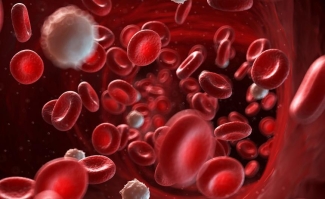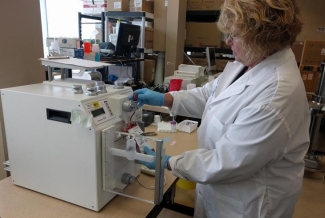Supporting vital research through our Centre for Innovation: Part 2
Wednesday, January 04, 2017 Dr. Kendra Hodgkinson
We are now accepting applications for the 2017 competition of our Intramural Research Grant (IRG) program!
The IRG program provides a research funding opportunity that supports collaborative research projects related to the mission of Canadian Blood Services. Applicants may be Canadian Blood Services scientists, medical officers or adjunct scientists and must be organized into teams of at least two investigators. Teams may also include researchers who are not affiliated with Canadian Blood Services.
Canadian Blood Services’ IRG Research Priority Areas
- Promoting appropriate blood product utilization
- Ensuring an adequate blood product supply
- Minimizing the adverse effects of blood product transfusion
- Optimizing blood product quality
- Replacing or improving blood products through new therapies or technologies
In the 2016 competition, Ontario-based researcher Dr. Kathryn Webert was a recipient of IRG funding. I wrote about two other recent IRG recipients in Supporting vital research through our Centre for Innovation: Part One.
Dr. Kathryn Webert – A multifaceted intervention to optimize red blood cell transfusion practice in two provinces
Dr. Webert is an associate professor with the department of medicine and the department of molecular medicine and pathology, an investigator with the McMaster Transfusion Research Program, and a medical director at Canadian Blood Services. Dr. Webert’s research interests include bleeding problems in stem cell transplant patients and optimizing the use of blood products. She received IRG funding last year to improve transfusion guidelines in Ontario.
People receive blood transfusions for many reasons including surgery, injury, cancer and blood diseases. In fact, one in ten hospitalized patients will receive at least one transfusion. But are all of these transfusions necessary? Recent evidence suggests that up to 20 per cent are not. Unnecessary transfusions have health risks for patients, put strain on the blood supply system and increase hospital costs.
Health-care providers decide whether to give transfusions based on the patient’s health status, amount of blood lost and blood hemoglobin levels. However, busy physicians may focus too much on laboratory test results without taking into account individual patient factors.
Dr. Webert’s project aims to reduce unnecessary transfusions and achieve a 90 per cent rate of “appropriate” transfusions (based on a recent peer-reviewed publication written by a group of researchers including Dr. Webert). The research team will do this by implementing blood transfusion guidelines in hospitals, educating nurses and doctors, initiating the screening of transfusion orders by medical laboratory technologists, and providing monthly feedback to physicians who have ordered unnecessary transfusions. Ensuring that transfusions are only given when required will reduce the risk to patients and improve the efficiency of the blood product supply system.

For this project, Dr. Webert is collaborating with researchers across Canada including Dr. Susan Nahirniak (University of Alberta), Dr. Yulia Lin (University of Toronto), Dr. Jeannie Callum (Sunnybrook Health Sciences Centre), and Dr. Michelle Zeller (McMaster University). The IRG program encourages collaboration in pursuit of a shared goal: improving the safety, effectiveness and/or efficiency of the blood supply system.
Find out more about the other research Canadian Blood Services’ Centre for Innovation supports by visiting Our Research Impact.
Canadian Blood Services Centre for Innovation receives financial support from the federal government (Health Canada) and provincial and territorial ministries of health.
Canadian Blood Services – Driving world-class innovation
Through discovery, development and applied research, Canadian Blood Services drives world-class innovation in blood transfusion, cellular therapy and transplantation—bringing clarity and insight to an increasingly complex healthcare future. Our dedicated research team and extended network of partners engage in exploratory and applied research to create new knowledge, inform and enhance best practices, contribute to the development of new services and technologies, and build capacity through training and collaboration.
The opinions reflected in this post are those of the author and do not necessarily reflect the opinions of Canadian Blood Services nor do they reflect the views of Health Canada or any other funding agency.
Related blog posts
Did you know that Canadian Blood Services directly funds innovative research?
“It’s in you to give" is the fantastically simple call to action from Canadian Blood Services. But for some people — such as those of us with a mixed bag of travel and medical histories — it isn’t so easy to just show up, roll up (a sleeve) and then settle back as this life-giving liquid flows into...

